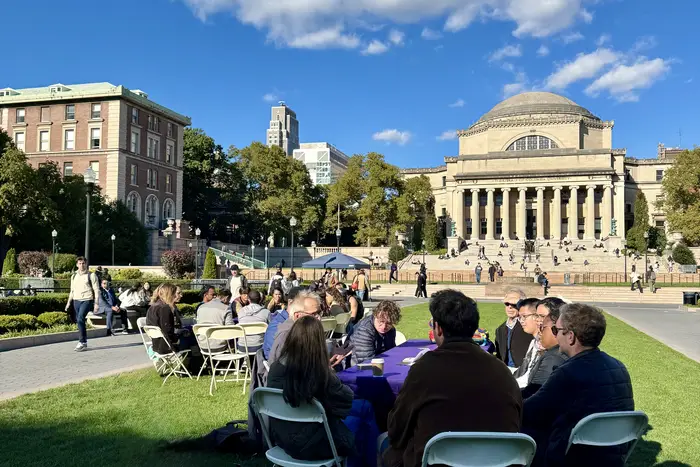Tensions continue to escalate at Columbia University, where the campus has become a focal point of national debate following the attacks in Israel on October 7, 2023. As the conflict in Gaza approaches its two-year anniversary, a new initiative aims to bridge the divide among students and staff through open dialogue.
Gil Eyal, a sociologist who specializes in trust, has initiated the “Listening Tables” series, inviting participants to engage in meaningful conversations. Eyal emphasized the importance of fostering understanding among individuals with differing viewpoints, stating, “The objective is to create a space to have a meaningful conversation, to talk to people who are very different from you.”
The series began amid heightened tensions between pro-Israel and pro-Palestinian groups on campus. Following protests that resulted in police intervention and allegations of antisemitism and Islamophobia, Columbia found itself under intense scrutiny from the Trump administration. Eyal expressed concerns about the feasibility of honest dialogue, particularly given the recent federal oversight imposed on the university. “Now, I’m not sure that I can really protect people if somebody decides to report them,” he noted.
Despite these challenges, Eyal chose to continue the initiative, believing that promoting dialogue across differences has never been more critical. “Columbia is polarized,” he stated. “Our student body is divided. There are divisions between the administration and the students, between the faculty and the administration, among the faculty. Those are real divisions. But the ability to sit together and to feel that you are listened to is a way of creating trust.”
The first Listening Table was held on the anniversary of the October attacks in 2024, coinciding with dueling protests on campus. Students displayed large milk cartons featuring images of Israeli hostages while others chanted “Free Palestine,” illustrating the intense emotions surrounding the issues at hand. The initiative has since hosted over 150 Tables with more than 2,000 participants, covering a wide range of topics beyond the Israel-Gaza conflict.
Junior student Beck Sappington highlighted the initiative’s significance, stating, “I really appreciate what the initiative is trying to do on campus. It felt like there were no valid outlets to speak about what’s on your mind.” For him, the Tables serve as a crucial pressure release for the turbulent atmosphere on campus.
Despite the inclusive nature of the discussions, some students have expressed difficulty addressing more contentious topics. In March 2023, the federal government froze $400 million in research funds to Columbia, citing ongoing issues of intimidation, harassment, and antisemitism on campus. This led to a settlement in June 2023 in which Columbia agreed to pay $221 million in fines and comply with increased federal oversight. The settlement included changes to the university’s disciplinary processes and new protest regulations.
The contested definition of antisemitism, which includes certain criticisms of Israel, has drawn criticism from faculty members who argue it stifles free speech. Some professors have opted not to teach courses this semester due to concerns about the chilling effect of this definition.
Despite the tense climate, Columbia administrators assert that free speech remains a cornerstone of the university experience. Amy Hungerford, dean of the Faculty of Arts and Sciences, stated, “It absolutely does, and the moment it doesn’t, then we’ve lost our way as a university.” She emphasized the need for respectful discourse, highlighting the significance of the Listening Tables in approaching difficult subjects.
A recent survey revealed that many Jewish and Muslim students feel excluded due to their religious identities and fear expressing their political views. Hungerford described the Tables as an essential platform for tackling these complex issues respectfully. “Education absolutely requires that you be able to ask hard questions and pursue them wherever the evidence takes you,” she explained.
Yet, Eyal noted that pro-Palestinian students have been hesitant to participate in the Tables, citing concerns over the current political environment. He acknowledged that skepticism exists among these students, particularly in light of the scrutiny from the Trump administration.
Hamid Dabashi, an Iranian-American professor and cofounder of the Center for Palestine Studies, has taken an active role in facilitating some of the Tables. He expressed empathy for the reluctance of pro-Palestinian and Muslim students to engage, citing an “anti-Palestinian, anti-Arab and Islamophobic element.” Dabashi hopes his involvement encourages more students from these backgrounds to participate. “I no longer trust in leadership, but I believe in citizenship,” he remarked. “I think our campus is wounded and needs healing.”
As Columbia University navigates the complexities of dialogue and dissent, the Listening Tables represent an effort to foster understanding and build bridges amid a deeply polarized environment.
